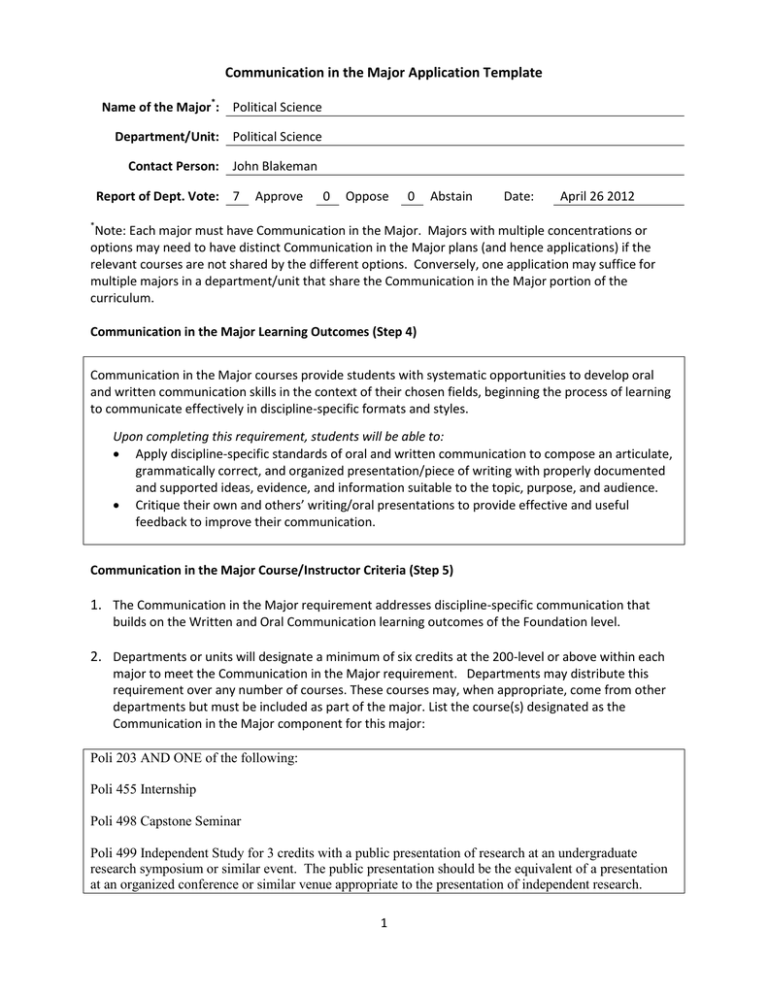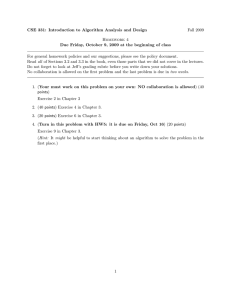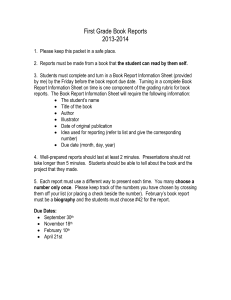Communication in the Major Application Template
advertisement

Communication in the Major Application Template Name of the Major*: Political Science Department/Unit: Political Science Contact Person: John Blakeman Report of Dept. Vote: 7 Approve 0 Oppose 0 Abstain Date: April 26 2012 * Note: Each major must have Communication in the Major. Majors with multiple concentrations or options may need to have distinct Communication in the Major plans (and hence applications) if the relevant courses are not shared by the different options. Conversely, one application may suffice for multiple majors in a department/unit that share the Communication in the Major portion of the curriculum. Communication in the Major Learning Outcomes (Step 4) Communication in the Major courses provide students with systematic opportunities to develop oral and written communication skills in the context of their chosen fields, beginning the process of learning to communicate effectively in discipline-specific formats and styles. Upon completing this requirement, students will be able to: Apply discipline-specific standards of oral and written communication to compose an articulate, grammatically correct, and organized presentation/piece of writing with properly documented and supported ideas, evidence, and information suitable to the topic, purpose, and audience. Critique their own and others’ writing/oral presentations to provide effective and useful feedback to improve their communication. Communication in the Major Course/Instructor Criteria (Step 5) 1. The Communication in the Major requirement addresses discipline-specific communication that builds on the Written and Oral Communication learning outcomes of the Foundation level. 2. Departments or units will designate a minimum of six credits at the 200-level or above within each major to meet the Communication in the Major requirement. Departments may distribute this requirement over any number of courses. These courses may, when appropriate, come from other departments but must be included as part of the major. List the course(s) designated as the Communication in the Major component for this major: Poli 203 AND ONE of the following: Poli 455 Internship Poli 498 Capstone Seminar Poli 499 Independent Study for 3 credits with a public presentation of research at an undergraduate research symposium or similar event. The public presentation should be the equivalent of a presentation at an organized conference or similar venue appropriate to the presentation of independent research. 1 3. These courses must include a plan for how student achievement of the approved Communication in the Major learning outcomes will be assessed. Please describe the overall plan for how Communication in the Major will be assessed within your major: Learning outcomes will be assessed within the major in at least two ways. First, students will complete course-specific assignments. For oral communication assignments will include at least one 5 minute oral presentation. For written communication assignments will consist of a total of 15 written pages and/or approximately 2000 words, with appropriate citations and bibliographical sources. Instructors can require one or many written assignments to satisfy the requirement. Second, the department will develop two common rubrics: one for assessing written communication, the other for assessing oral communication. At this time the department has guidelines for its Writing Emphasis (WE) courses, and those guidelines will serve as the foundation for the written communication rubric. The department will develop a rubric for oral communication during the Fall 2012 semester. It will rely on oral presentation guidelines from existing political science courses. As regards assessment of Communication in the Major courses in relation to the department’s overall assessment of its courses for the GEP, instructors who teach Communication in the Major courses will maintain student writing assignments in digital format for assessment purposes. The department anticipates maintaining digital copies of oral presentations, or other files relevant to oral communication (such as powerpoint presentations) that will also be used for broader assessment purposes. The department may choose to implement one or both of these assessment mechanisms too: Direct assessment: instructors identify papers that represent the best, weakest and average work in the Communication in the Major courses, and those papers are retained for assessment purposes. Indirect assessment: Students in Communication in the Major courses will complete a questionnaire in which they assess other students’ written work and oral presentations. 4. All instructors teaching Communication in the Major courses must complete a workshop coordinated by the Center for Academic Excellence and Student Engagement. A. The General Education Committee will work with Bill Lawlor (current WE coordinator) and a representative from the Division of Communication to develop a Communication in the Major training (combining both written and oral communication skills). This will be handled similarly to how WE is handled now. We will rely on departments to comply with the requirement to ensure that those who teach Communication in the Major components have the required training. B. Anyone who is currently WE certified will be asked to complete an abbreviated training (focusing on the oral communication aspect of the new Communication in the Major requirement). This will allow existing WE instructors to migrate into the new GEP fairly easily. C. New instructors completing the new Communication in the Major training will be “reverse grandfathered” and be granted WE certification. (WE classes will need to be offered beyond 2013 for those students who are completing their degrees under the GDR system.) The Political Science Department will make sure that faculty attend GEP workshops on Communication in the Major. 2 5. Communication in the Major courses should have sufficiently small enrollments so that students will receive adequate personal feedback, from both instructors and their peers, on their communication skills. Please describe the approximate enrollments in the various courses that will be included in your Communication in the Major requirement: Enrollment in Poli 203 will be capped at 25. Enrollment in Poli 455 Internship will be capped at 20. Historically its enrollment is no more than 10 students per semester. Enrollment in Poli 498 Capstone will be capped initially at 20, but may increase to no more than 25 depending on demand. Enrollment in Poli 499 Independent Study will normally be capped at 1, although it is possible that more than one student may wish to enroll in a small group project leading to a research presentation. 6. Assignments should be based on the kinds of communication typical of the relevant discipline or profession. Describe the oral and written work that students will do in your Communication in the Major courses and explain how these reflect what is typical in your discipline. Attach a representative syllabus and assignment for at least one course. Poli 203 will satisfy oral and written communication requirements through the collection of data, analysis and interpretation of that data using appropriate qualitative and quantitative methods from political science, and an in-class presentation(s) explaining the process of data collection, interpretation, and conclusions. Other courses will satisfy oral and written requirements by requiring an oral presentation of at least 5 minutes, and written work totaling 15 pages or approximately 2000 words. 7. Both writing and speaking instruction should be integrated into course discussions and activities and include grading criteria, revision experiences, and opportunities for student peer review. Writing and speaking instruction can be taught together in a single course or divided among courses. Describe (or attach) the grading criteria for the oral and written assignments in your Communication in the Major courses and describe the way that peer review and revision will be incorporated into these courses. Grading criteria: Grading criteria will be based on a common rubric agreed upon by the department. At this time each instructor teaching Writing Emphasis courses maintains a rubric unique to that course but based on broad WE grading criteria. It is expected that the current political science WE criteria will serve as a template for a Communication in the Major grading rubric. However, the final grading rubric will also be substantially different as it will include not only written communication but also oral communication. At this time the department has not developed a grading rubric. Revision experiences: students will have the opportunity to revise and resubmit written work. Student peer review: students will peer review oral presentations. Some political science courses currently have grading templates/rubrics for student review of oral presentations and those will be used to create a new rubric common to all Communication in the Major courses. 3



